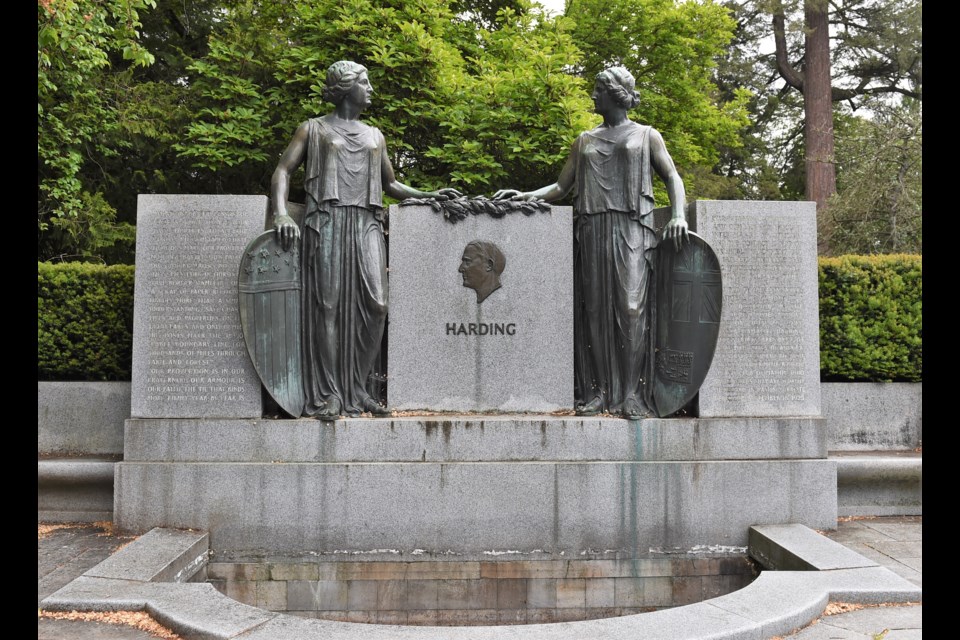Typically memorials are created for people of great importance to that community.
Civic leaders, great athletes, military personnel and community fixtures are all honoured this way. Rarely do cities memorialize leaders of foreign countries; this is even more true when that leader barely had an impact on the city.
So why does Vancouver have a rather impressive memorial to American President Warren G. Harding, widely regarded as one of the worst presidents of all time, and who served just over two years?
So it's 1923...
One hundred years ago travel was not as simple as it is now. Federal leaders' journeys, especially across big countries like Canada and the U.S., were big deals. In fact, while Alaska had been purchased in 1867, no sitting president had visited the territory until 1923.
Harding, elected in 1921, was an incredibly popular president but was facing new and growing criticism in Washington. A tour across the U.S. was planned for a few reasons, including boosting his public image.
One of his stops was Alaska; he left from Tacoma, Washington on a naval vessel and skipped B.C. on his way north.
However, on the way back south, it was decided Harding would do another thing no sitting president had done.
He visited Canada.
So it's July 26, 1923
Vancouver was picked for a one-day visit by Harding: July 26, 1923. It was a big deal for the growing city and the province's premier and city's mayor greeted Harding at the dock, along with military personnel, a 21-gun salute, and thousands of locals.
Harding, First Lady Florence Harding, and the American entourage drove to Stanley Park where an estimated 40,000 people gathered to hear the popular president give a speech; the Stanley Park bandstand was specially equipped with a bigger sound system to blast his voice across the park.
After the speech, Harding headed to a golf course in Shaughnessy for a round, but after playing a few holes he skipped to the end. He hadn't been feeling well for a while (he was 57), and exhaustion was catching up to him, but it was decided he'd play the final couple of holes to keep up appearances.
A couple more events were held, but before midnight the president was aboard the ship once again and steaming toward Seattle.
So it's a week later and Harding is dead
Harding didn't stay in Seattle long. On July 27 he held a couple more public events before he called it a night; it was the last time he'd hold a public event.
His health deteriorated quickly and his entourage headed to San Francisco by train the next day. Over the next few days, his health was up and down.
On Aug. 2 he appeared to be doing better, but that evening, as his wife read him an article, he died; the cause isn't certain, but it's believed to have been a heart attack.
So it's 1925
Harding's death was a shock. He'd just won a landslide presidential victory a couple of years earlier and while it was known he had health issues, it didn't seem dire. Around the world, he'd been seen as a symbol of peace, as well, in a world recovering from WW1.
Immediately following his death there was a huge outpouring in favour of him; in that light the Kiwanis clubs of North America (Harding was a member) funded a memorial for him. In 1925 it was unveiled to thousands of people just steps from where he'd been two years earlier.
The memorial was created by local sculptor Charles Marega, who also designed the Lions Gate Bridge lions, among other well-known sculptures and statues around Vancouver. It features American and Canadian (circa 1925) iconography and a section of Harding's Vancouver speech.
It was so popular at the time multiple postcards were made of the memorial, along with other souvenirs.
So it's 2023
After Harding's death, a number of personal and political scandals that were brewing boiled over. It was discovered that he had at least two significant affairs while a political figure, including one while president.
Corruption also took its toll on his name; the Teapot Dome scandal, which had to do with oil reserves controlled by the navy, ended with Harding's Secretary of the Interior in prison. It was the biggest White House scandal until Watergate.
By 1948 he was already regarded as one of, if not the, worst presidents of all time by scholars. In major scholarly rankings, since 1948 he's been ranked the worst president of all time at least nine times. The highest he's ranked is 29th, but that's when there had only been 29 presidents. At best, Harding was ranked 37th out of 44. In 2022 he was ranked 42, one ahead of Donald Trump.
The memorial still stands, though it's a little hidden by events at the Malkin Bowl. It stands near where the bandstand used to be, set against some trees with the ponds of the Stanley Park Pavilion not far away.



